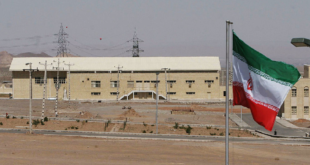17-08-2020
 DUBAI/ JERUSALEM/ WASHINGTON: The United Arab Emirates’ (UAE) agreement to normalise ties with Israel is a “sovereign decision” that was not directed at Iran, UAE Minister of State for Foreign Affairs Anwar Gargash said.
DUBAI/ JERUSALEM/ WASHINGTON: The United Arab Emirates’ (UAE) agreement to normalise ties with Israel is a “sovereign decision” that was not directed at Iran, UAE Minister of State for Foreign Affairs Anwar Gargash said.
Israel and the UAE announced they were establishing full diplomatic relations in a US-brokered deal that will see Israel delay plans for annexation of land it already illegally occupies that is sought by the Palestinians for their future state.
“The UAE-Israeli peace treaty is a sovereign decision not directed at Iran. We say this and repeat it. We do not accept interference in our decisions,” Gargash said on Twitter on Monday.
On Sunday, the UAE summoned Iran’s charged affaires in Abu Dhabi and gave him a “strongly worded memo” in response to a speech by Iranian President Hassan Rouhani that the foreign ministry described as “unacceptable”.
Speaking on Saturday, Rouhani said the UAE had made a “huge mistake” in reaching an agreement to normalise ties with Israel and called it a betrayal by the Gulf state.
The US-sponsored deal has been seen as firming up opposition to regional power Iran, which Gulf states, Israel and Washington view as the main threat in the conflict-riven Middle East.
 On Sunday, the secretary-general of the six-member Gulf Cooperation Council condemned “threats” by Rouhani and other Iranian officials towards the UAE over the accord.
On Sunday, the secretary-general of the six-member Gulf Cooperation Council condemned “threats” by Rouhani and other Iranian officials towards the UAE over the accord.
Israel Prime Minister Benjamin Netanyahu has insisted the annexation plans are only on “temporary hold” at the request of the US.
On Sunday, Israel’s intelligence minister Eli Cohen told Army Radio that Bahrain and Oman could be the next Gulf countries to follow the UAE in formalising ties with Israel.
Israel signed peace agreements with Egypt in 1979 and Jordan in 1994. But the UAE, along with most other Arab nations, has had no formal diplomatic or economic relations with it.
Oman maintains friendly ties with the US and Iran and has previously been a go-between for the two feuding countries.
A close ally of Saudi Arabia – which has not yet commented on the UAE-Israel accord – Bahrain hosted a senior Israeli official at a security conference in 2019 as well as a US-led conference on boosting the Palestinian economy as part US President Donald Trump’s Middle East plan.
 Government sources in Kuwait said its position towards Israel is unchanged, and it will be the last country to normalise relations, local newspaper al-Qabas reported.
Government sources in Kuwait said its position towards Israel is unchanged, and it will be the last country to normalise relations, local newspaper al-Qabas reported.
On the other hand, the Jewish Army says its tanks have attacked Hamas targets in the Gaza Strip in response to Palestinian rockets and airborne firebombs launched into southern Israel.
“Tanks targeted a number of military observation posts belonging to the Hamas terror organisation in the Gaza Strip,” an army statement said on Monday, referring to the group that rules the enclave.
The army said that, in addition to cross-border attacks with explosives and incendiary devices suspended from balloons, dozens of people had also “instigated riots along the Gaza Strip security fence” on Sunday evening.
There were no immediate reports of casualties.
The Palestinian territory has been under an Israeli blockade since 2007. Israel cites security threats from Hamas for its land and naval blockade.
 The latest incidents follow a week of heightened tensions, during which Israel has also closed the Karem Abu Salem (Kerem Shalom) goods crossing with the Gaza Strip and shut down Gaza’s permitted coastal fishing zone on Sunday.
The latest incidents follow a week of heightened tensions, during which Israel has also closed the Karem Abu Salem (Kerem Shalom) goods crossing with the Gaza Strip and shut down Gaza’s permitted coastal fishing zone on Sunday.
Palestinian officials said the closure of the crossing in particular affected the importation of construction materials.
On Thursday, Israel said it would stop shipments of fuel into Gaza in response to the incendiary balloons.
Hamas spokesman Fawzi Barhoum called the measure a “grave act of aggression” that would deepen Gaza’s economic hardship.
The Israeli army said Palestinian “rioters burned tyres, hurled explosive devices and grenades towards the security fence and attempted to approach it” on Saturday evening.
That was followed on Sunday by Israeli air attacks on Gaza, including what a military statement called “a military compound used to store rocket ammunition” belonging to Hamas.
Despite a truce last year backed by the UN, Egypt and Qatar, the two sides clash sporadically with rockets, mortar fire or incendiary balloons.
 Speaking from Jerusalem, he said the escalation was related to the dire economic situation inside Gaza, explaining that the enclave has seen increasing levels of unemployment and more people living under the poverty line.
Speaking from Jerusalem, he said the escalation was related to the dire economic situation inside Gaza, explaining that the enclave has seen increasing levels of unemployment and more people living under the poverty line.
“Hamas has a real problem to deal with, and as we’ve seen in the past during such phases, Hamas tends to turn up the temperature. That’s what seems to be happening. There has been a return to the launching of incendiary balloons and kites and setting of fires.
“The calculation, it seems, is that they want to see Israel make good on some of the commitments Hamas says Israel made last year when there was an understanding reached to try and bring some calm after a series of escalations, such allowing more international contributions to allow for rebuilding infrastructure, the start of an industrial zone … and increased electricity,” said Fawcett.
The Gaza Strip has a population of two million, more than half of whom live in poverty, according to the World Bank.
Palestinian anger has flared since Israel and the United Arab Emirates on Thursday agreed to normalise relations, a move many Palestinians saw as a betrayal of their cause by the Gulf country. (Int’l News Desk)
 Pressmediaofindia
Pressmediaofindia




